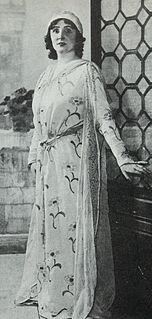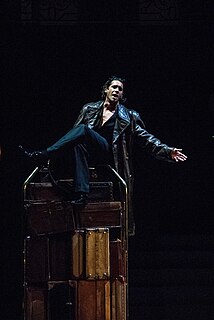
The Barber of Seville, or The Useless Precaution is an opera buffa in two acts by Gioachino Rossini with an Italian libretto by Cesare Sterbini. The libretto was based on Pierre Beaumarchais's French comedy Le Barbier de Séville (1775). The première of Rossini's opera took place on 20 February 1816 at the Teatro Argentina, Rome, with designs by Angelo Toselli.

In music, an aria is a self-contained piece for one voice, with or without instrumental or orchestral accompaniment, normally part of a larger work. An aria is a formal musical composition unlike its counterpart, the recitative.

Ariodante is an opera seria in three acts by George Frideric Handel. The anonymous Italian libretto was based on a work by Antonio Salvi, which in turn was adapted from Canti 4, 5 and 6 of Ludovico Ariosto's Orlando Furioso. Each act contains opportunities for dance, originally composed for dancer Marie Sallé and her company.
Ecco or ECCO may refer to:

Umberto Antonio Tozzi is an Italian pop and rock singer and composer. Over the course of his career, he has sold over 70 million records in different languages internationally, and his biggest international hits are: "Claridad", "Gloria", "Tu" and "Ti Amo".

Cavatina is a musical term, originally meaning a short song of simple character, without a second strain or any repetition of the air. It is now frequently applied to any simple, melodious air, as distinguished from brilliant arias or recitatives, many of which are part of a larger movement or scena in oratorio or opera.

I Lombardi alla Prima Crociata is an operatic dramma lirico in four acts by Giuseppe Verdi to an Italian libretto by Temistocle Solera, based on an epic poem by Tommaso Grossi, which was "very much a child of its age; a grand historical novel with a patriotic slant". Its first performance was given at the Teatro alla Scala in Milan on 11 February 1843. Verdi dedicated the score to Maria Luigia, the Habsburg Duchess of Parma, who died a few weeks after the premiere. In 1847, the opera was significantly revised to become Verdi's first grand opera for performances in France at the Salle Le Peletier of the Paris Opera under the title of Jérusalem.

Orlando is an opera seria in three acts by George Frideric Handel written for the King's Theatre in London in 1733. The Italian-language libretto was adapted from Carlo Sigismondo Capece's L'Orlando after Ludovico Ariosto's Orlando Furioso, which was also the source of Handel's operas Alcina and Ariodante. More an artistic than a popular success at its first performances, Orlando is today recognised as a masterpiece.

Giulio Regondi was a Swiss-born classical guitarist, concertinist and composer active in France and (mainly) the United Kingdom.
The Aria di sorbetto, or "sorbet aria", was a convention of Italian opera in the early nineteenth century. It comprised a short solo performed by a secondary character in the opera.
"Una furtiva lagrima" is the romanza from act 2, scene 3 of the Italian opera L'elisir d'amore by Gaetano Donizetti. It is sung by Nemorino (tenor) when it appears that the love potion he bought to win the heart of his dream lady, Adina, works. Nemorino is in love with Adina, but she is not interested in a relationship with an innocent, rustic man. To win her heart, Nemorino buys a love potion with all the money he has in his pocket. That love potion is actually a cheap red wine sold by a traveling quack doctor, but when he sees Adina weeping, he knows that she has fallen in love with him, and he is sure that the "elixir" has worked.

"O mio babbino caro" is a soprano aria from the opera Gianni Schicchi (1918) by Giacomo Puccini to a libretto by Giovacchino Forzano. It is sung by Lauretta after tensions between her father Schicchi and the family of Rinuccio, the boy she loves, have reached a breaking point that threatens to separate her from Rinuccio. It provides an interlude expressing lyrical simplicity and love in contrast with the atmosphere of hypocrisy, jealousy, double-dealing, and feuding in medieval Florence. It provides the only set-piece in the through-composed opera.

Ildebrando D'Arcangelo is an Italian opera singer. He has been called a bass-baritone, though he himself prefers the term basso cantabile.
A catalogue aria is a genre of opera aria in which the singer recounts a list of information that was popular in Italian comic opera in the latter half of the eighteenth and early nineteenth centuries. "Madamina, il catalogo è questo" from Wolfgang Amadeus Mozart's Don Giovanni is the most famous example, and is often referred to as "the catalogue aria". Leporello notes how many lovers the title character has had in each country he has visited. Pasquale sings two such arias in Joseph Haydn's Orlando paladino, "Ho viaggiato in Francia, in Spagna" in act one, which lists the countries to which he has traveled, and "Ecco spiano" in act 2, which rattles off all of his varied musical talents.

Ero e Leandro, also known after its first line as Qual ti reveggio, oh Dio, is a 1707 Italian-language cantata by George Frideric Handel, composed during his stay in Rome to a libretto believed to be written by Cardinal Pietro Ottoboni. It is a reworking of the Greek myth of Hero and Leander, with the soprano soloist taking the role of Hero. In it, Hero finds her love, Leander, drowned, tears out her hair, thus symbolically rejecting the beauty which had led to Leander's fascination with her, then drowns herself. It is composed for a soprano solo, and a small orchestra consisting of two oboes, and two string sections: a concertino of solo violin and violoncello, and a concerto grosso made up of two violins, a viola, and continuo. In Ero e Leandro, Recitatives alternate with arias, as was normal at the period for not only cantatas, but oratorios and operas as well; however, unusually, Ero e Leandro ends with a recitative, instead of an aria.

Armida is an opera in three acts by Josef Mysliveček set to a libretto by Giovanni Ambrogio Migliavacca based on an earlier libretto by Philippe Quinault. It is one of many operas set at the time of the Crusades that is based on characters and incidents from Torquato Tasso's epic poem La Gerusalemme liberata. This opera belong to the serious type in Italian language referred to as opera seria. It incorporates many elements from the operatic "reform" movement of the 1770s, including short vocal numbers and short choruses incorporated into the fabric of the drama and lavish use of accompanied recitative.

La Calliroe is an opera in three acts by Josef Mysliveček set to a libretto by Matteo Verazi that is based on Greek legends about the Oceanid Callirrhoe. This opera belong to the serious type in Italian language referred to as opera seria. Vocal pieces from the opera composed for the singer Luigi Marchesi in the role of Tarsile were widely copied in eighteenth-century collections of operatic arias.
François-René Gebauer was a French composer, professor, and bassoonist and the son of a German military musician. He had four brothers, Michel-Joseph Gebauer (1763–1812), Pierre-Paul Gebauer, Jean-Luc Gebauer, and Étienne-François Gebauer, all of whom were also musicians and composers. The brothers played together in a quintet that was modeled on woodwind quintet instrumentation but modified by removing the flute parts to include their brother Jean-Luc, who was a percussionist. The quintet received favorable reviews from critics, who found the music to be "unusually lively for a wind quintet" and "full of earthly elegance".
Richard Conrad was an American singer, voice teacher, and impresario whose voice at times inhabited both the tenor and baritone ranges. He sang in opera, cabaret and musicals. He is perhaps best known for his 1963 recorded collaboration with Joan Sutherland and Marilyn Horne, conducted by Richard Bonynge, known as The Age of Bel Canto.
André Mallabrera was a French tenor. Born in Oran,, he was the son of singer José Mallabrera.










